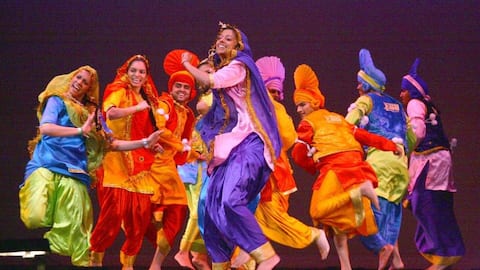Celebrating Baisakhi: Honoring tradition, community, and harvest
What's the story
Every spring, the vibrant festival of Baisakhi brings a burst of color and energy to the Indian subcontinent. Each year celebrated on April 13 predominantly in the northern state of Punjab and among Sikh communities worldwide, this festival holds immense cultural and religious significance. It serves as a joyous occasion marked by traditional rituals, communal gatherings, and the spirit of renewal and unity.
Birth of Khalsa
Khalsa Panth Foundation
The Baisakhi festival marks the onset of the harvest season and commemorates the founding of Khalsa (pure, clear, and free) Panth, the Sikh community of warriors, by Guru Gobind Singh Ji in 1699. Baisakhi is celebrated by people from diverse backgrounds, not limited to Sikhs and Punjabis. Known as "Khalsa Sirjana Diwas," or "the birth of Khalsa," it holds significance beyond cultural boundaries.
Gratitude
The essence of Baisakhi: The onset of harvest season
At its core, Baisakhi embodies the spirit of renewal and thanksgiving. It serves as a reminder of the interconnectedness between humanity and nature, highlighting the importance of agrarian life in shaping communities. For farmers, Baisakhi symbolizes the fruition of their hard work and dedication, as they reap the fruits of their labor and offer gratitude for the abundance bestowed upon them by the land.
Community spirit
Baisakhi dynamic celebrations
During Baisakhi, individuals visit Gurudwaras to express gratitude for the harvest and the new season. Sikhs engage in customs like spirited Bhangra and Gidda dances, relish cuisine, and contribute to Langar (a community meal service) for societal welfare. Fairs promote local businesses, featuring martial arts demonstrations by children and teenagers, accompanied by drummers. Men showcasing swordsmanship add excitement to the celebrations.
Kada Prasad
Baisakhi's culinary delights and offerings
During Baisakhi, Sikhs relish a variety of delectable foods, symbolizing abundance and celebration. Traditional dishes like sarson da saag with makki di roti, sweet rice, lassi, and sweet treats like jalebi and pinni are savored. Kada Prasad or Atte Ka Halwa, made from whole wheat flour, ghee, and sugar, hold special significance as itare offered as prasad in Gurudwara during Baisakhi.
